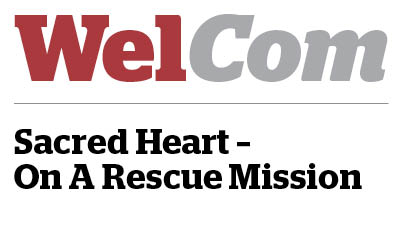June 2016
Reflections
Fr James Lyons
The human heart is symbolically seen as the centre or essence of a person – at the heart of the matter. It is the universal symbol of love, affection and care.
Heart of Jesus points to God’s boundless love and mercy, and draws us into the mystery of suffering. Devotion to the Sacred Heart recognises Jesus as both human and divine, bringing love, compassion and suffering together as unique signposts on our journey to God.
The Feast of the Sacred Heart of Jesus has been in the Catholic liturgical calendar since 1856. The date depends on that of Easter. It is celebrated on a Friday, 19 days after Pentecost Sunday. Pentecost is 50 days after Easter. This year, the Sacred Heart of Jesus is honoured on Friday, June 3.
Where is your treasure? It is where you will find your heart. That’s the message of Jesus, encouraging us to ‘seek the things that are above’ and not to be too anxious about the things of earth that decay and rust and disappear (see Matthew 6:21).
So where do we find the heart of Jesus? It is right here, among us. We are his treasure!
But we are of the earth and our time is limited. Why does Jesus regard us as ‘treasure’? In order to save us from ourselves, to open our eyes to the wonder of God’s plan for us, and to help us discover where the real and lasting treasure is to be found – in that sense, we are treasure to be rescued!
Remember Jesus’ beautiful and consoling affirmation: God loved the world so much that he gave his only son – not to condemn the world, but to offer eternal life (see John 3:16). We are God’s treasure, God’s art gallery, and God does not want to lose such a wonderful collection.
The feast of the Sacred Heart, coming after the days that commemorate the core beliefs of Christianity – Easter, Pentecost, Trinity, Corpus Christi – provides a moment to contemplate the depth of the mystery that is ‘Emmanuel’: God-with-us.
Accepting the heart as the ‘seat of emotions’ we can easily identify with a love that reaches out to help and to serve. We can often see a gift or a good quality in others before they can see it in themselves. A friend might even risk the friendship to save a friend from an unrecognised disaster.
We speak of having a ‘heart-to-heart’ with someone we love or highly value and don’t want to see hurt or disappointed. This requires generosity, trust and often considerable sacrifice, but we do it because we think the other person is ‘worth the cost’.
The scripture readings for the Sacred Heart Mass, covering the three-year cycle, reflect this same desire to encourage and to give in selfless service. The image of God bending down, like a parent, lifting the child to hold and feed (Hosea, 11), the God who ‘set his heart on you and chose you’ (Deuteronomy 7:7), is one of great tenderness.
In the gospel passages there is the shepherd theme where the lost sheep is sought with great love (Luke 15:3-7), and the invitation of Jesus to find rest in him (Matthew 11:30). The crucifixion scene (John 19:31-37) with the piercing of the heart of Jesus, shows the totality of his offering. He had nothing left to give.
The feast of the Sacred Heart of Jesus flows into the following day with the Immaculate Heart of Mary, a reminder that Mary, the mother of Jesus, suffered with him and also for us. It is Mary’s offering that invites our own participation for she is the human model of one reaching the potential towards which God calls each of us.
Gifting ourselves to suffer with others, and for others, copies the pattern set by Jesus and draws us ever closer to the treasure he came to reveal.
Pope Francis is reawakening the gift of tenderness within the Church through his ministry of humble service. This is essential to a proper understanding of the message of the Sacred Heart.
In his recent publication, Amoris Laetitia – The Joy of Love, following the synod on the family, Pope Francis gives us a strong lead by writing that all the baptised, regardless of their personal situation, should feel ‘as living members, able to live and grow in the Church and experience her as a mother who welcomes them always, who takes care of them with affection and encourages them along the path of life and the Gospel.’ [AL. 299]
God loved the world so much… This needs to be constantly before our minds as we live each day. God’s love is for our potential, not for our imperfections. God knows our capabilities and desires our collaboration to bring together and to completion the created universe God first set in motion.
